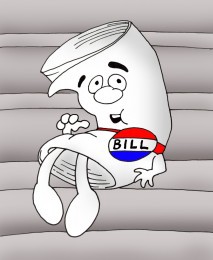How Do We Pay Regular Bills With Irregular Income?

The regular paycheck is, increasingly, a buffalo: not a fictional creature but one hunted nearly to the verge of extinction. Because it is So Damn Useful. Regular paychecks help you plan, save, and answer such important life questions as “Can I afford to have another kid?”
On a more basic day-to-day level, they also make civilization possible: when we get regular paychecks, we can pay our regular bills. Often even on time!
But more and more of us have to cope with not getting regular paychecks, like Nicole, and like the Ortiz family of fast-food workers we read about yesterday. 53 million, by one count, or 34% of the total workforce. Robert Reich thinks, “A majority of workers will be on their own by 2030.”
We deal with dry spells punctuated by irregular bursts of money. This is the new Freelance Economy, and it’s hell or heaven depending on how optimistic/entrepreneurial you are, or how much you like having coworkers, or whether you’ve ended up in this pit of uncertainty from which you must fight your way out by choice.
The takeaway at the end of the month is the same, though: how on earth will we pay our bills? Well, according to Newsweek, there’s an app for that — or there will be soon.
As the economy continues to embrace on-demand work arrangements, also known as the freelance economy, an increasing percentage of the workforce will face some weeks (or even months) where they are forced to live on unlivable wages. To survive, many turn to options like overdrafts and payday loans to pay their bills. But as helpful as those services can be, they also have the potential to hurt by racking up interest charges and fees.
Enter Even, a financial service that hopes to revolutionize banking.
“We’re starting to realize that a big problem for the people working hourly and part-time jobs is not so much the amount of money that they make but the inconsistency of that income,” says Even co-founder Quinten Farmer. “What we’re trying to do is…move people away from products that require them to pay interest.”
By gaining access to your financial history, Even is able to calculate an average weekly income and pay you this amount every Friday. If your hours are cut one week, it will make up the difference, interest-free. Then, if you get scheduled for a few extra hours in a subsequent week, Even will use the surplus to pay off any amount it has loaned to you in the past or will put the money aside into savings for you.
Even also offers emergency assistance — giving you early access to your next paycheck for no additional fee. But the service does come with a cost: a flat rate of five dollars a week.
Billfold pal and freelancer-who-makes-it-work Devon Maloney is quoted expressing polite skepticism about the idea of outsourcing day-to-day money management and bill pay to a third party. (“While Maloney thinks that the service would be attractive to a lot of people, she worries it would inhibit customers from learning how to manage their own money.”) Assuming Even could make late fees and such a thing of the past, would the potential peace of mind be worth it to you for $5 a month? Would you happily pass on the responsibility or would you prefer to soldier on? Do you have a better way?
Support The Billfold
The Billfold continues to exist thanks to support from our readers. Help us continue to do our work by making a monthly pledge on Patreon or a one-time-only contribution through PayPal.
Comments